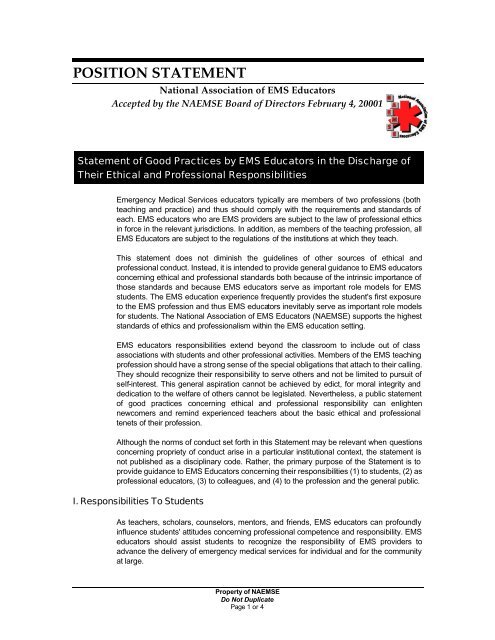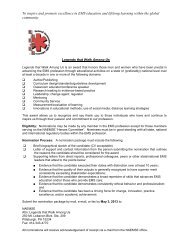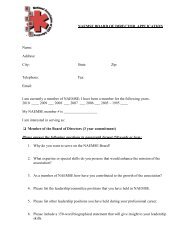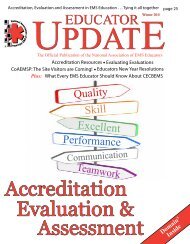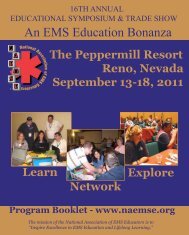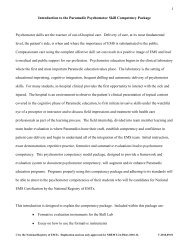Statement of Good Practices by EMS Educators in the Dischaâ¦
Statement of Good Practices by EMS Educators in the Dischaâ¦
Statement of Good Practices by EMS Educators in the Dischaâ¦
You also want an ePaper? Increase the reach of your titles
YUMPU automatically turns print PDFs into web optimized ePapers that Google loves.
POSITION STATEMENT<br />
National Association <strong>of</strong> <strong>EMS</strong> <strong>Educators</strong><br />
Accepted <strong>by</strong> <strong>the</strong> NA<strong>EMS</strong>E Board <strong>of</strong> Directors February 4, 20001<br />
<strong>Statement</strong> <strong>of</strong> <strong>Good</strong> <strong>Practices</strong> <strong>by</strong> <strong>EMS</strong> <strong>Educators</strong> <strong>in</strong> <strong>the</strong> Discharge <strong>of</strong><br />
Their Ethical and Pr<strong>of</strong>essional Responsibilities<br />
Emergency Medical Services educators typically are members <strong>of</strong> two pr<strong>of</strong>essions (both<br />
teach<strong>in</strong>g and practice) and thus should comply with <strong>the</strong> requirements and standards <strong>of</strong><br />
each. <strong>EMS</strong> educators who are <strong>EMS</strong> providers are subject to <strong>the</strong> law <strong>of</strong> pr<strong>of</strong>essional ethics<br />
<strong>in</strong> force <strong>in</strong> <strong>the</strong> relevant jurisdictions. In addition, as members <strong>of</strong> <strong>the</strong> teach<strong>in</strong>g pr<strong>of</strong>ession, all<br />
<strong>EMS</strong> <strong>Educators</strong> are subject to <strong>the</strong> regulations <strong>of</strong> <strong>the</strong> <strong>in</strong>stitutions at which <strong>the</strong>y teach.<br />
This statement does not dim<strong>in</strong>ish <strong>the</strong> guidel<strong>in</strong>es <strong>of</strong> o<strong>the</strong>r sources <strong>of</strong> ethical and<br />
pr<strong>of</strong>essional conduct. Instead, it is <strong>in</strong>tended to provide general guidance to <strong>EMS</strong> educators<br />
concern<strong>in</strong>g ethical and pr<strong>of</strong>essional standards both because <strong>of</strong> <strong>the</strong> <strong>in</strong>tr<strong>in</strong>sic importance <strong>of</strong><br />
those standards and because <strong>EMS</strong> educators serve as important role models for <strong>EMS</strong><br />
students. The <strong>EMS</strong> education experience frequently provides <strong>the</strong> student's first exposure<br />
to <strong>the</strong> <strong>EMS</strong> pr<strong>of</strong>ession and thus <strong>EMS</strong> educators <strong>in</strong>evitably serve as important role models<br />
for students. The National Association <strong>of</strong> <strong>EMS</strong> <strong>Educators</strong> (NA<strong>EMS</strong>E) supports <strong>the</strong> highest<br />
standards <strong>of</strong> ethics and pr<strong>of</strong>essionalism with<strong>in</strong> <strong>the</strong> <strong>EMS</strong> education sett<strong>in</strong>g.<br />
<strong>EMS</strong> educators responsibilities extend beyond <strong>the</strong> classroom to <strong>in</strong>clude out <strong>of</strong> class<br />
associations with students and o<strong>the</strong>r pr<strong>of</strong>essional activities. Members <strong>of</strong> <strong>the</strong> <strong>EMS</strong> teach<strong>in</strong>g<br />
pr<strong>of</strong>ession should have a strong sense <strong>of</strong> <strong>the</strong> special obligations that attach to <strong>the</strong>ir call<strong>in</strong>g.<br />
They should recognize <strong>the</strong>ir responsibility to serve o<strong>the</strong>rs and not be limited to pursuit <strong>of</strong><br />
self-<strong>in</strong>terest. This general aspiration cannot be achieved <strong>by</strong> edict, for moral <strong>in</strong>tegrity and<br />
dedication to <strong>the</strong> welfare <strong>of</strong> o<strong>the</strong>rs cannot be legislated. Never<strong>the</strong>less, a public statement<br />
<strong>of</strong> good practices concern<strong>in</strong>g ethical and pr<strong>of</strong>essional responsibility can enlighten<br />
newcomers and rem<strong>in</strong>d experienced teachers about <strong>the</strong> basic ethical and pr<strong>of</strong>essional<br />
tenets <strong>of</strong> <strong>the</strong>ir pr<strong>of</strong>ession.<br />
Although <strong>the</strong> norms <strong>of</strong> conduct set forth <strong>in</strong> this <strong>Statement</strong> may be relevant when questions<br />
concern<strong>in</strong>g propriety <strong>of</strong> conduct arise <strong>in</strong> a particular <strong>in</strong>stitutional context, <strong>the</strong> statement is<br />
not published as a discipl<strong>in</strong>ary code. Ra<strong>the</strong>r, <strong>the</strong> primary purpose <strong>of</strong> <strong>the</strong> <strong>Statement</strong> is to<br />
provide guidance to <strong>EMS</strong> <strong>Educators</strong> concern<strong>in</strong>g <strong>the</strong>ir responsibilities (1) to students, (2) as<br />
pr<strong>of</strong>essional educators, (3) to colleagues, and (4) to <strong>the</strong> pr<strong>of</strong>ession and <strong>the</strong> general public.<br />
I. Responsibilities To Students<br />
As teachers, scholars, counselors, mentors, and friends, <strong>EMS</strong> educators can pr<strong>of</strong>oundly<br />
<strong>in</strong>fluence students' attitudes concern<strong>in</strong>g pr<strong>of</strong>essional competence and responsibility. <strong>EMS</strong><br />
educators should assist students to recognize <strong>the</strong> responsibility <strong>of</strong> <strong>EMS</strong> providers to<br />
advance <strong>the</strong> delivery <strong>of</strong> emergency medical services for <strong>in</strong>dividual and for <strong>the</strong> community<br />
at large.<br />
Property <strong>of</strong> NA<strong>EMS</strong>E<br />
Do Not Duplicate<br />
Page 1 or 4
Because <strong>of</strong> <strong>the</strong>ir <strong>in</strong>evitable function as role models, <strong>EMS</strong> educators should be guided <strong>by</strong><br />
<strong>the</strong> most sensitive ethical and pr<strong>of</strong>essional standards. As follows:<br />
<strong>EMS</strong> educators should aspire to excellence <strong>in</strong> teach<strong>in</strong>g and to mastery <strong>of</strong> <strong>the</strong> <strong>the</strong>ories and<br />
practices <strong>of</strong> <strong>the</strong>ir subjects.<br />
They should prepare conscientiously for class and employ teach<strong>in</strong>g methods appropriate<br />
for <strong>the</strong> subject matters and objectives <strong>of</strong> <strong>the</strong>ir courses.<br />
The objectives and requirements <strong>of</strong> <strong>the</strong>ir courses, <strong>in</strong>clud<strong>in</strong>g applicable attendance and<br />
grad<strong>in</strong>g rules, should be clearly stated.<br />
Classes should be met as scheduled or, when this is impracticable, classes should be<br />
rescheduled at a time reasonably convenient for students, or alternative means <strong>of</strong><br />
<strong>in</strong>struction should be provided.<br />
<strong>EMS</strong> educators have an obligation to treat students with civility and respect and to foster a<br />
stimulat<strong>in</strong>g and productive learn<strong>in</strong>g environment <strong>in</strong> which <strong>the</strong> pros and cons <strong>of</strong> debatable<br />
issues are fairly acknowledged.<br />
<strong>EMS</strong> educators should nurture and protect <strong>in</strong>tellectual freedom for <strong>the</strong>ir students and<br />
colleagues.<br />
Evaluation <strong>of</strong> student work is one <strong>of</strong> <strong>the</strong> fundamental obligations <strong>of</strong> <strong>EMS</strong> educators. As<br />
follows:<br />
Exam<strong>in</strong>ations and assignments should be conscientiously designed and all student work<br />
should be evaluated with impartiality.<br />
Grad<strong>in</strong>g should be done <strong>in</strong> a timely fashion and should be consistent with standards<br />
recognized as legitimate with<strong>in</strong> <strong>the</strong> <strong>in</strong>stitution and <strong>the</strong> pr<strong>of</strong>ession.<br />
A student who so requests should be given an explanation <strong>of</strong> <strong>the</strong> grade assigned.<br />
<strong>EMS</strong> educators should be reasonably available to counsel students about academic<br />
matters, career choices, and pr<strong>of</strong>essional <strong>in</strong>terests. In perform<strong>in</strong>g this function:<br />
<strong>Educators</strong> should make every reasonable effort to ensure that <strong>the</strong> <strong>in</strong>formation <strong>the</strong>y<br />
transmit is timely and accurate.<br />
When <strong>in</strong> <strong>the</strong> course <strong>of</strong> counsel<strong>in</strong>g an <strong>EMS</strong> educator receives <strong>in</strong>formation that <strong>the</strong> student<br />
may reasonably expect to be confidential, <strong>the</strong> educator should not disclose that<br />
<strong>in</strong>formation unless required to do so <strong>by</strong> <strong>in</strong>stitutional rule or applicable law.<br />
<strong>Educators</strong> should <strong>in</strong>form students concern<strong>in</strong>g <strong>the</strong> possibility <strong>of</strong> such disclosure.<br />
<strong>Educators</strong> should be as fair and complete as possible when communicat<strong>in</strong>g evaluative<br />
recommendations for students and should not permit undesirable or irrelevant<br />
considerations to <strong>in</strong>fect <strong>the</strong>se recommendations.<br />
If <strong>in</strong>formation disclosed <strong>in</strong> confidence <strong>by</strong> <strong>the</strong> student to <strong>the</strong> educator makes it impossible<br />
for <strong>the</strong> educator to write a fair and complete evaluation/recommendation without reveal<strong>in</strong>g<br />
<strong>the</strong> <strong>in</strong>formation, <strong>the</strong> educator should so <strong>in</strong>form <strong>the</strong> student and refuse to provide <strong>the</strong><br />
evaluation/recommendation unless <strong>the</strong> student consents to full disclosure.<br />
Property <strong>of</strong> NA<strong>EMS</strong>E<br />
Do Not Duplicate<br />
Page 2 or 4
Discrim<strong>in</strong>atory conduct based on such factors as race, color, religion, national orig<strong>in</strong>, sex,<br />
sexual orientation, disability or handicap, age, or political beliefs is unacceptable <strong>in</strong> <strong>the</strong><br />
<strong>EMS</strong> education community. To follow:<br />
<strong>EMS</strong> educators should seek to make <strong>the</strong> education sett<strong>in</strong>g a hospitable community for all<br />
students.<br />
<strong>EMS</strong> educators should be sensitive to <strong>the</strong> harmful consequences <strong>of</strong> <strong>in</strong>structor or student<br />
conduct or comments <strong>in</strong> classroom discussions or elsewhere that perpetuate stereotypes<br />
or prejudices <strong>in</strong>volv<strong>in</strong>g such factors.<br />
<strong>EMS</strong> educators should not sexually harass students and should not use <strong>the</strong>ir role or<br />
position to <strong>in</strong>duce a student to enter <strong>in</strong>to a sexual relationship, or to subject a student to a<br />
hostile academic environment based on any form <strong>of</strong> sexual harassment.<br />
Sexual relationships between an <strong>EMS</strong> educator and a student who are not married to<br />
each o<strong>the</strong>r or who do not have a preexist<strong>in</strong>g similar relationship are <strong>in</strong>appropriate<br />
whenever <strong>the</strong> educator has a pr<strong>of</strong>essional responsibility for <strong>the</strong> student <strong>in</strong> such matters as<br />
teach<strong>in</strong>g a course or <strong>in</strong> o<strong>the</strong>rwise evaluat<strong>in</strong>g, supervis<strong>in</strong>g, or advis<strong>in</strong>g a student as part <strong>of</strong><br />
a school program.<br />
Even when an educator has no pr<strong>of</strong>essional responsibility for a student, <strong>the</strong> educator<br />
should be sensitive to <strong>the</strong> perceptions <strong>of</strong> o<strong>the</strong>r students that a student who has a sexual<br />
relationship with a pr<strong>of</strong>essor may receive preferential treatment from <strong>the</strong> educator or <strong>the</strong><br />
educator's colleagues.<br />
An educator who is closely related to a student <strong>by</strong> blood or marriage, or who has a<br />
preexist<strong>in</strong>g similar relationship with a student, normally should avoid roles <strong>in</strong>volv<strong>in</strong>g a<br />
pr<strong>of</strong>essional responsibility for <strong>the</strong> student.<br />
II. Responsibilities As Pr<strong>of</strong>essional <strong>Educators</strong><br />
A basic responsibility <strong>of</strong> <strong>the</strong> community <strong>of</strong> <strong>EMS</strong> educators is to ref<strong>in</strong>e, extend, and transmit<br />
knowledge. As members <strong>of</strong> that community, <strong>EMS</strong> educators share with <strong>the</strong>ir colleagues <strong>in</strong><br />
<strong>the</strong> o<strong>the</strong>r education and pr<strong>of</strong>essional discipl<strong>in</strong>es <strong>the</strong> obligation to discharge that<br />
responsibility. <strong>EMS</strong> educational <strong>in</strong>stitutions and programs also have a responsibility to<br />
ma<strong>in</strong>ta<strong>in</strong> an atmosphere <strong>of</strong> freedom and tolerance <strong>in</strong> which knowledge can be sought and<br />
shared without h<strong>in</strong>drance. <strong>EMS</strong> educators are obligated, <strong>in</strong> turn, to make <strong>the</strong> best and<br />
fullest use <strong>of</strong> that freedom to fulfill <strong>the</strong>ir scholarly responsibilities.<br />
In teach<strong>in</strong>g, as well as <strong>in</strong> research, writ<strong>in</strong>g, and publication, <strong>the</strong> scholarship <strong>of</strong> o<strong>the</strong>rs is<br />
<strong>in</strong>dispensable to one's own knowledge. An <strong>EMS</strong> educator has a responsibility to be<br />
<strong>in</strong>formed concern<strong>in</strong>g <strong>the</strong> relevant knowledge base <strong>in</strong> <strong>the</strong> fields <strong>in</strong> which <strong>the</strong> educator writes<br />
and teaches. To keep current <strong>in</strong> any field requires cont<strong>in</strong>u<strong>in</strong>g study. To this extent <strong>the</strong><br />
<strong>EMS</strong> educator must rema<strong>in</strong> a student. <strong>EMS</strong> educators have a responsibility to engage <strong>in</strong><br />
<strong>the</strong>ir own research and publish <strong>the</strong>ir conclusions. In this way, <strong>EMS</strong> educators participate <strong>in</strong><br />
an <strong>in</strong>tellectual exchange that tests and improves <strong>the</strong>ir knowledge <strong>of</strong> <strong>the</strong> field, to <strong>the</strong><br />
ultimate benefit <strong>of</strong> <strong>the</strong>ir students, <strong>the</strong> pr<strong>of</strong>ession, and society.<br />
The <strong>EMS</strong> educator's commitment to truth requires <strong>in</strong>tellectual honesty and openm<strong>in</strong>dedness.<br />
Although an <strong>EMS</strong> educator should feel free to criticize ano<strong>the</strong>r's work,<br />
distortion or misrepresentation is always unacceptable. Relevant evidence and arguments<br />
should be addressed. Conclusions should be frankly stated, even if unpopular.<br />
Property <strong>of</strong> NA<strong>EMS</strong>E<br />
Do Not Duplicate<br />
Page 3 or 4
When ano<strong>the</strong>r's scholarship is used-whe<strong>the</strong>r that <strong>of</strong> ano<strong>the</strong>r educator or that <strong>of</strong> student-it<br />
should be fairly summarized and candidly acknowledged. Significant contributions require<br />
acknowledgement <strong>in</strong> every context <strong>in</strong> which ideas are exchanged. Publication permits at<br />
least three ways <strong>of</strong> do<strong>in</strong>g this: shared authorship, attribution <strong>by</strong> footnote or endnote, and<br />
discussion <strong>of</strong> ano<strong>the</strong>r's contribution with<strong>in</strong> <strong>the</strong> ma<strong>in</strong> text.<br />
An <strong>EMS</strong> educator has a responsibility to preserve <strong>the</strong> <strong>in</strong>tegrity and <strong>in</strong>dependence <strong>of</strong><br />
research and new knowledge. Sponsored or remunerated research should always be<br />
acknowledged with full disclosure <strong>of</strong> <strong>the</strong> <strong>in</strong>terests <strong>of</strong> <strong>the</strong> parties.<br />
III. Responsibilities To Colleagues<br />
<strong>EMS</strong> educators should treat colleagues and staff members with civility and respect.<br />
<strong>EMS</strong> educators should comply with <strong>in</strong>stitutional rules or policies requir<strong>in</strong>g confidentiality<br />
concern<strong>in</strong>g oral or written communications. Such rules or policies frequently will exist with<br />
respect to personnel matters and evaluations <strong>of</strong> student performance.<br />
As is <strong>the</strong> case with respect to students (Part I), sexual harassment, or discrim<strong>in</strong>atory<br />
conduct <strong>in</strong>volv<strong>in</strong>g colleagues or staff members on <strong>the</strong> basis <strong>of</strong> race, color, religion, national<br />
orig<strong>in</strong>, sex, sexual orientation, disability or handicap, age, or political beliefs is<br />
unacceptable.<br />
IV. Responsibilities To The <strong>EMS</strong> Community And General Public<br />
An <strong>EMS</strong> educator occupies a unique role as a bridge between <strong>the</strong> <strong>EMS</strong> community and<br />
students prepar<strong>in</strong>g to become members <strong>of</strong> that community. It is important that <strong>EMS</strong><br />
educators accept <strong>the</strong> responsibilities <strong>of</strong> pr<strong>of</strong>essional status. At a m<strong>in</strong>imum, an <strong>EMS</strong><br />
educator should adhere to <strong>the</strong> Code or Rules <strong>of</strong> Conduct <strong>of</strong> <strong>the</strong> state <strong>EMS</strong> division.<br />
Conduct warrant<strong>in</strong>g discipl<strong>in</strong>e as an <strong>EMS</strong> educator or provider should be a matter <strong>of</strong><br />
serious concern to <strong>the</strong> <strong>EMS</strong> educator’s school and <strong>the</strong> general public.<br />
One <strong>of</strong> <strong>the</strong> traditional obligations <strong>of</strong> educators is to engage <strong>in</strong> uncompensated public<br />
service. As role models for students and as members <strong>of</strong> <strong>the</strong> <strong>EMS</strong> pr<strong>of</strong>ession, <strong>EMS</strong><br />
educators share this responsibility. This responsibility can be met <strong>in</strong> a variety <strong>of</strong> ways,<br />
<strong>in</strong>clud<strong>in</strong>g direct patient contact through public aid programs, lectur<strong>in</strong>g <strong>in</strong> cont<strong>in</strong>u<strong>in</strong>g <strong>EMS</strong><br />
education programs, educat<strong>in</strong>g public school pupils or o<strong>the</strong>r public groups concern<strong>in</strong>g <strong>the</strong><br />
<strong>EMS</strong> system.<br />
Adopted and modified with permission from:<br />
Sean Prichard<br />
Publications Manager, The Association <strong>of</strong> American Law Schools <strong>Statement</strong> <strong>of</strong> <strong>Good</strong><br />
<strong>Practices</strong> <strong>by</strong> Law Pr<strong>of</strong>essors <strong>in</strong> <strong>the</strong> Discharge <strong>of</strong> Their Ethical and Pr<strong>of</strong>essional<br />
Responsibilities http://www.aals.org/ethic.html<br />
Property <strong>of</strong> NA<strong>EMS</strong>E<br />
Do Not Duplicate<br />
Page 4 or 4


